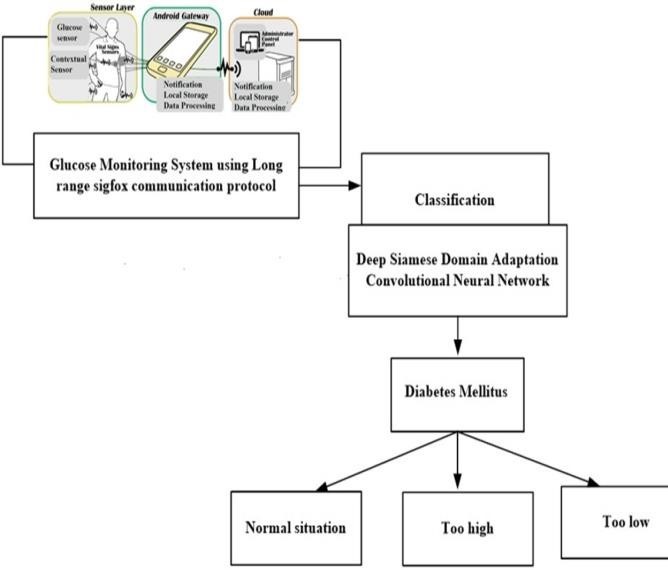IOT Based Continuous Glucose Monitoring for Diabetes Mellitus using Deep Siamese Domain Adaptation Convolutional Neural Network
Main Article Content
Abstract
The phrase "Internet of Things" (IoT) refers to the forthcoming generation of the Internet, which facilitates interaction among networked devices. IoT functions as an assistant in medicine and is critical to a variety of uses that monitor healthcare facilities. The pattern of observed parameters can be used to predict the type of the disease. Health experts and technologists have developed an excellent system that employs commonly utilized technologies like wearable technology, wireless channels, and other remote devices to deliver cost-effective medical surveillance for people suffering from a range of diseases. Network-connected sensors worn on the body or put in living areas collect large amounts of data to assess the patient's physical and mental wellbeing. In this Manuscript, IoT -based Continuous Glucose Monitoring for Diabetes Mellitus using Deep Siamese Domain Adaptation Convolutional Neural Networ k (CGM-DM- DSDACNN) is proposed. The goal of the work that has been described to investigate whether Continuous Glucose Monitoring System (CGMS) on the basis of IoT is both intrusive also secure. The job at hand is for making an architecture based on IoT that extends from the sensor model to the back-end and displays blood glucose level, body temperature, and contextual data to final users like patients and doctors in graphical and text formats. A higher level of energy economy is also attained by tailoring the Long range Sigfox communication protocol to the glucose monitoring device. Additionally, analyse the energy usage of a sensor device and create energy collecting components for it. Present a Deep Siamese Domain Adaptation Convolutional Neural Network (DSDACNN) as a last resort for alerting patients and medical professionals in the event of anomalous circumstances, like a too -low or too-high glucose level.

